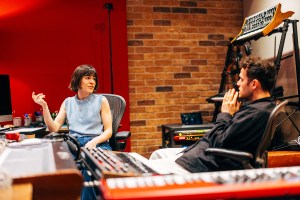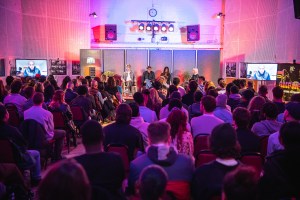Abbey Road Boss Sally Davies on Studio One’s Massive Revamp and ‘Turbo-Charging’ Its Next Decade
In its time Abbey Road’s Studio One has witnessed some of cinema’s most nerve-jangling scenes: scores to Star Wars, the Lord of The Rings trilogy and the Harry Potter series were all cut in this legendary room. For Sally Davies, Abbey Road Studios’ managing director, it wasn’t the images on the projector that had her on tenterhooks, but the judgments from movie greats on one of the biggest moments in the studio’s history: Studio One’s long-overdue revamp.
It was the first time the room had been refreshed and each decision – should the walls be repainted, or merely cleaned? – carried the jeopardy of impacting the acoustics of a beloved room. The space can host a 100-piece orchestra and was initially used by classical musicians before becoming the preferred recording space of score composers. Following a session earlier this year conducted by two-time Academy Award winner Alexandre Desplat for Jurassic World: Rebirth, the verdict was in: “The room sounds brighter,” Desplat told a relieved Davies.
These are some of the challenges facing Davies in one of the U.K. music industry’s most important and unique roles. “You’ve got an iconic heritage in your hands, and have to make sure you do it justice,” Davies tells Billboard U.K. in the lounge overlooking Studio One in late August. She describes the position as a “custodianship and guardianship” and likens it to the titular role of TV show Dr. Who.
Abbey Road Studios in St. John’s Wood, London first opened in 1931 and was the home for classical music in Britain with Elgar, Prokofiev and Stravinsky all conducting orchestras here. It was known as EMI Studios until 1976, and saw off the threat of redevelopment when EMI put it up for sale in 2010. Ownership eventually transferred to Universal Music subsidiary Virgin Music in 2012.
In its time, the Studios have been at the heart of some of the most beloved and successful recorded music ever released: The Beatles’ Sgt. Pepper’s Lonely Hearts Club Band (1967), Pink Floyd’s Dark Side of the Moon (1974), and Radiohead’s The Bends (1995) to name a few. Recent occupants include Stormzy, Ezra Collective, Little Simz and Florence + The Machine.

Abbey Road Studios Amplify.
Sam Kay
But while fans of the Fab Four still queue up outside to walk the same zebra crossing seen on the front of the band’s 1969 LP Abbey Road, Davies is tasked with looking to the future. With the centenary anniversary looming in 2031, the wider brand is undergoing a refresh to continue its place at the heart of music culture. “I see my job as being here to fuel and turbocharge the next decade of Abbey Road,” Davies says.
On Oct. 2, the studios will host the latest edition of the Music Photographers Awards and honor U2 and Depeche Mode collaborator Anton Corbijn, as well as upcoming snappers. Amplify and Equalise, two programs that champion emerging recording and performing talent (particularly for women), are as important to Davies as the latest superstar swanning through the corridors.
“Those programmes help us stay at the forefront of music, otherwise people just associate us with Beatles and Pink Floyd – which is great, by the way – but I want to talk about the other stuff too,” Davies says.
Davies was appointed managing director by Universal Music in 2023. Her resume includes stints at the capital’s Science Museum and The O2 Arena; her last role prior to Abbey Road was as chief executive of live producer and promoter U-Live, owned by Vivendi. When David Joseph, then CEO of Universal Music U.K., tapped her for the position, she was hesitant and wanted to know more about how her people skills would mesh with the environment.
“He said that it’s a really complicated environment, and it’s a bit like managing a football team. You’ve got the players who need the locker room chat to deliver their best performance; the sponsors in the stands which help pay the bills, and then the fans who have expectations. There’s a lot going on there…”
The best way to learn the ropes, Davies says, was to simply observe. She spent the first nine months connecting with studio engineers, producers and runners to understand the rhythm of Abbey Road and received a crash course in achieving audio excellence. Getting to know people’s distinct points of views was key to cracking the studio’s unique “hierarchal” culture.
“I liken myself to being a conductor in an orchestra. I don’t play an instrument, but I can put you together and make sure you play the right moment in time together and that it sounds great.” She says empowering the studio’s 100 full-time employees to speak up when necessary is vital to a positive, collaborative atmosphere. “We need to make sure we’re capturing different perspectives and debate them; that’s far better than someone holding onto a viewpoint and not being able to air it.”

Abbey Road Studios – Amplify 2022, November 12th 2022.
Carsten Windhorst
Now settled in the role for two years, Davies is keen to reaffirm their place in the creative process on a global scale. “What is a studio without the music that’s made in it? We have to be a home of music making and a hub of creativity, because it’s that that brings Abbey Road Studios to life – otherwise we’re just real estate.”
The portfolio is constantly expanding and decentralizing the Studios is a key aim. She points towards AudioMovers, an app that enables remote collaboration on recordings, which was acquired in 2021, and the Abbey Road Institute which trains budding students in Amsterdam, Mumbai and Miami as examples of this change. A recent collaboration with Adidas Originals saw the construction of a new studio in Manchester’s Co-op Live, and received a co-sign from Bruce Springsteen when he played the venue and toured the space.
Davies says the goal is to increase their global footprint and their presence in the consumer space. “The brand is well known across the globe, but the business is still here. We want to see how we can make it a truly global business, and also how to bring Abbey Road into your lounge, pocket or your car. We can influence your audio experience in so many ways.”
Abbey Road Studios remains one of the crown jewels in the U.K.’s music industry, and should be a shining example of British excellence. The space continually attracts global superstars (SZA, Harry Styles, and Frank Ocean have all recorded here in recent years) and Davies says it’s her job to ensure that the studio – and the wider U.K. scene – recognizes itself for its achievements.
“The music we make here is world-moving. It travels all over and makes people happy, and we should be shouting about that,” Davies says. “One of my main focuses is to share the breadth of what we do, and the level of ambition and innovation. We’re wonderfully British and too modest and humble, but maybe we need to be a bit more celebratory.”
The most recent phase of the refresh includes a reception area that spotlights the studio’s role in audio innovation, with priceless pieces of recording equipment being displayed to visitors. Next will be a rethink to ensure the Studios offer a welcoming atmosphere for first-timers. An improved concierge service for talent is also on the agenda, and Davies likens the atmosphere to a “boutique hotel.”
These are all stepping stones on the road to 2031’s big centenary anniversary, an opportunity to take stock of a British success story. “We want to show we’ve shaped music recording, music production and creativity over the past 100 years,” Davies says.



